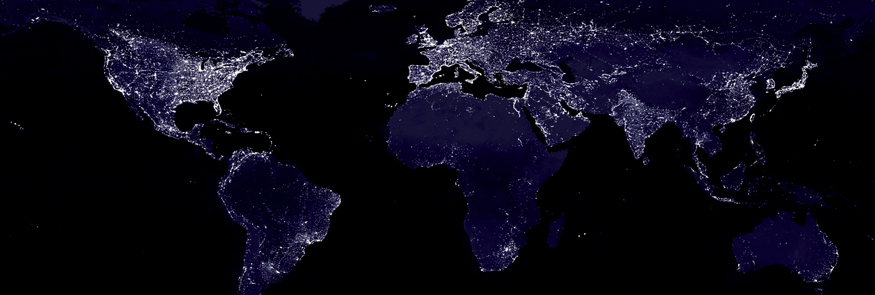The Constraint of Choice
Removing barriers to authentic global communication

Early proponents of the World Wide Web envisioned a global space where people from across the world could easily “meet” and exchange ideas. Many Internet users today likely feel that they are in tune with a multitude of topics and voices from around the world, but in reality, that’s hardly the case. They may have the impression that they are participating in a global dialogue, but they’re actually trapped in conversations with like-minded people. True convergence demands that we develop new tools and techniques, and use the ones we already have in a different way. In the following essay, Ethan Zuckerman discusses the challenges to creating a truly global conversation. by Ethan Zuckerman
MANY OF US are what I would term “imaginary cosmopolitans.” We think we are getting a wide view of the world, but we’re not. For example, Twitter is thought to be a mostly Anglo-phenomenon, but how many people in the English-speaking world are aware that 11-percent of the Brazilian online population — five million people — use twitter? Next to Japan, it’s the second most represented population, and by comparison, only about 8-percent of Americans and Britons Tweet. Here’s another interesting fact about Twitter: 24-percent of American Twitter users are African-Americans. That’s roughly twice as high as this group’s representation in the American population. Some may find these statistics shocking, but they shouldn’t, because the so-called “global conversation” we think we are having is really more like a giant collection of segregated conversations between like-minded people. At the end of the day we really don’t know what many of our neighbors or fellow citizens are thinking or doing, let alone the rest of the world.
Excluding language barriers, one could easily enter these conversations, but we overwhelmingly choose not to. Instead of striving to find a wider picture of the world, we end up in what some call “filter bubbles”, where we interact with people we already know and with people similar to those we already know. Social networking sites like Facebook and Twitter help us pretend that we are accessing a wider viewpoint, when we’re essentially herding together with people who have comparable perspectives and beliefs. When I study my own behavior on the Internet, I find that it is also discouragingly parochial. It’s possible for me to get my morning news from all over the world, but I don’t. Instead, I tend to choose a domestic source like The New York Times.
When the Internet first grew in popularity, it was assumed by many co-called Cyber-Utopians, that it would be a tremendously powerful force for global communication and the smoothing out of cultural differences. It was assumed that weightless digital bits (ideas) would be far more mobile than atoms (i.e. products that must be shipped). But as it turns out, at least for now, it’s the other way around. It’s a lot more common to buy a bottle of water from Fiji, despite the time and expense that it takes to ship it, than it is to watch a movie from Fiji or read that country’s news.
Not so flat after all
It’s a popular expression today to call the world “flat”, when in fact it’s actually quite lumpy. Yes, business is more global than it used to be, but most conversations aren’t. Production and competition may be global or “flat”, but that’s only one piece of what’s going on around the world. Much of the world’s manufacturing has gone to China, but China has yet to emerge as a global cultural power. I compare this phenomenon to the world’s airline flight patterns. The skies are filled with airplanes — there are a lot of flights between New York and London, Dubai and Shanghai — but how many flights are traveling between South America and Africa?
Some maintain that it’s perhaps better not to promote too much of a global conversation because it might “flatten” cultural diversity. The worry is that if one particular culture is especially dominant, such as the United States, it will essentially colonize and flatten everybody else. In fact, recent studies show that cultures are a whole lot more resistant to outside influence than we usually think. Cultures generally have very good firewalls against each other. Far more worrisome in my view is that we are suffering from just the opposite — cultural ignorance. With a lot of cultures, there is simply no interaction at all.
In many ways people today are less global in their outlook today than in previous decades. If you look at American television newscasts from the 1970s, international news made up 30-percent of broadcasts. Today that number today is 12-percent. The elite print media isn’t much better; they tend to report domestic news and news from other wealthy nations, as well as news from a smattering of “global hotspots” like the Middle East. Even Wikipedia has a heavy Western bias, because that is where most of its contributors live. And this is a global phenomenon. Roughly 95% of the readership in Germany, China, Japan, France and America get their news from domestic news sites. Such trends clearly encourage a distorted local-centric view of the world.
Barriers of Interest
Ironically, all this is happening at a time when the cost of retrieving information from around the world is essentially zero. This can be explained by what I call the constraint of choice. The idea that we are bombarded with some sort of mythical “information overload” is nonsense; we are constrained by our own barriers of interest. Despite the tremendous potential of the Internet and other technological advances, we are still governed by basic human behavior. If you think about humanity in cultural terms, we are only a few generations removed from living in small villages, where it is unlikely that we had much interaction with people of other languages or cultures. If you go back a few dozen generations before that, people were essentially living in small bands united by family bonds. We don’t have particularly well-developed framework for interacting with the needs and wants of others, let alone dealing with people far outside of our sub-group.
You can see this manifest itself in a number of ways, from anti-immigrant rage to the current Islam-phobia in the United States and other Western nations. This sort of tribalism was likely a very successful adaptation in historical terms, but at this particular moment in time, it is probably maladaptive. We are living in a very global moment at a time when we are still programmed to live in small communities. When given a choice between paying attention to issues of local concern, as opposed to issues from father away, we tend to choice the former. But today’s problems, such as Climate Change and Bird Flu to name but a few, are global in scale and scope and they desperately require a conversation on a global scale to realize global solutions.
There are a number of ways that can increase the level of international dialogue on the Internet. The first thing we need to do is to create a better set of filters. This can be done, albeit awkwardly, using technology with the creation of a different sort of search engine that encourages serendipity: the discovery of something that you didn’t know you wanted to know. This can also be done manually with “bridge figures”. These are people with deep roots in two different cultural contexts who can bridge the divide for the rest of us. In the context of the Internet, they are highly skilled Web curators who are adept at choosing information of interest to at least two cultures. We use a huge number of bridge figures in the Global Voices project that I help lead. Our Middle East editor, for example, splits her time between Canada and Bahrain. She knows what issues are likely to be of interest to a Western audience, but she also knows what is of interest to her audience in the Middle East. She is able to draw the connection between the two. Translation is another obvious area where we can help more people have their views read and heard, and far more needs to be done in this area. I’d like to see good translations far more readily available on the Web than they already are.
If we believe that we are not getting a global enough picture of the world, if we believe that we are not being prepared for a global society, then we need to make big changes in how we interact with information and — and not just in terms of what we read in the news — but how we educate and prepare our children to be tomorrow’s global citizens. We need to reconsider how we educate our children, which is clearly a large undertaking. But the outline of what we need — the infrastructure — is basically there. What we need to do now is figure out how to rewire the systems we already have. The tools are there; we just need to learn how to use them better.

Ethan Zuckermann, a senior researcher at Harvard University's Berkman Center for Internet & Society, is the co-founder of Global Voices Online -- a community of more than 300 bloggers and translators around the world who strive to publicize voices that are not ordinarily heard in the international mainstream media. In 2002, he was selected as one of the top 100 innovators under the age of 35 by MIT's Technology Review Magazine, and named a Global Leader for Tomorrow by the World Economic Forum.
PHOTO: NASA/CORBIS





